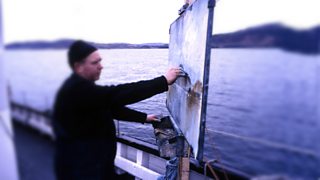The Emergency - Creative freedom in wartime Dublin
Regan Hutchins tells the story of how dancers, spies, writers and artists brought a welcome burst of creativity to neutral Dublin during World War II.
At the beginning of the Second World War in 1939 the Irish leader Éamon De Valera vowed that Ireland would play no part in the conflict. Instead he declared a state of emergency.
Neutrality had serious political consequences for Ireland, but in Dublin the city saw a brief burst of creativity as writers, artists, dancers and thinkers sought refuge from the war. There were art openings, poetry readings, dance performances, recitals and underground house parties. Restaurants were filled across the city and hotels held daily dances and jazz nights.
The story of 1940s Dublin is more complex, however. There was great poverty, fuel shortages, travel restrictions and a constant threat of invasion. For some artists and writers there was also a sense of isolation and confusion.
Writers such as Seán Ó’Faoláin, who felt a strong intellectual connection to Europe, agonised over the decision to remain neutral. Another writer, Elizabeth Bowen, saw her role as a ‘marriage counsellor’ between Britain and Ireland at a time when relations between those two countries were at a low point.
The White Stag Group of artists, the poet John Betjeman (from Britain), the dancer Erina Brady (from Germany) and the physicist Erwin Schrodinger (from Austria) may all have spent an evening in The Palace Bar with the Irish writers and artists who regularly propped up the bar there.
With its German and Japanese diplomats, Dublin was also a potential den of spies and to add to the chaotic mix there was a strict regime of censorship as well as a constant wave of propaganda over the wireless.
In this programme, Regan Hutchins hears how this confusion and creativity fed into the life of the city to bring about a new, welcome energy. It was a time of hardship but also a time of collaboration, intrigue and play.
The programme features Professor Clair Wills from Cambridge University, the historians Diarmaid Ferriter, Mairtín Mac Con Iomaire and Tommy Graham, writers Eibhear Walshe, Deirdre Mulrooney, Arthur Riordan, archivist Jennifer Fitzgibbon, curators Seán Kissane (Irish Museum of Modern Art) and Michael Waldron (The Crawford Gallery, Cork). It also features contributions from Aidan Kelly and Harry Williams who were children during The Emergency years.
Producer: Regan Hutchins
A New Normal Culture production for ����ý Radio 3
Last on
More episodes
Previous
Music Played
-
![]()
Edvard Grieg
Sommerfugl
Performer: Sigurd Slåttebrekk.
Broadcasts
- Sun 19 Jan 2020 22:15����ý Radio 3
- Sun 13 Mar 2022 18:45����ý Radio 3
Featured in...
![]()
Arts
Creativity, performance, debate
What was really wrong with Beethoven?
Classical music in a strongman's Russia – has anything changed since Stalin's day?
What composer Gabriel Prokofiev and I found in Putin's Moscow...
Six Secret Smuggled Books
Six classic works of literature we wouldn't have read if they hadn't been smuggled...
Grid
Seven images inspired by the grid
World Music collector, Sir David Attenborough
The field recordings Attenborough of music performances around the world.




